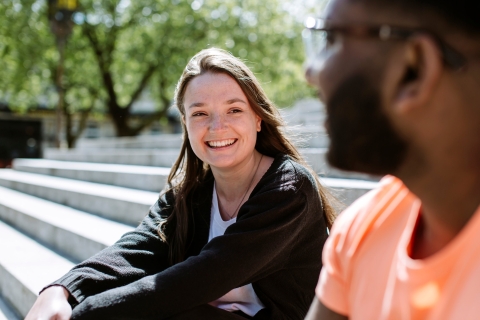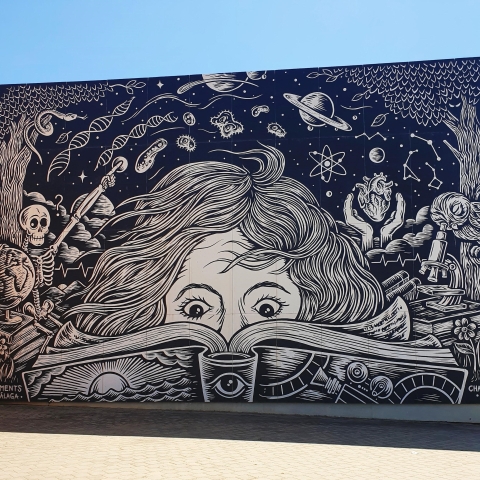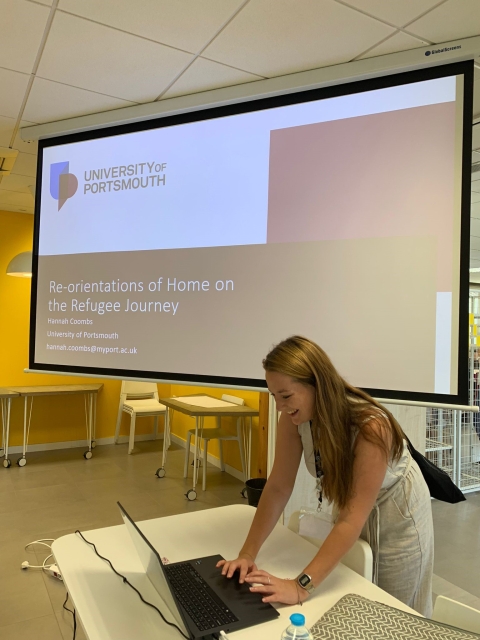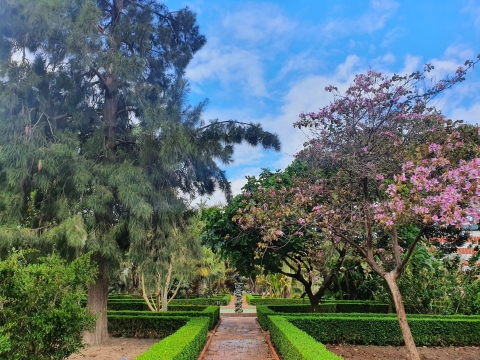

Each month, the Graduate School is sharing a Student Spotlight with our postgraduate research community, highlighting the amazing research being undertaken by our postgraduate researchers.
4 minutes
Our Student Spotlight for June is Hannah Coombs, a student at the University of Portsmouth working on her PhD in English Literature with a focus on autobiographical literature by those who fled the Holocaust and contemporary conflicts as children. Her research engages with intimate and everyday perspectives of the international migratory experiences. She recently completed a four week placement at the University of Málaga as part of the Turing Scheme.
Why Málaga?
My PhD Research focuses on child refugee narratives, analysing autobiographical accounts of refugees’ experiences. I approach this research from the perspective of intimate and everyday encounters. I argue that this perspective is far more perceivable and understandable for children than the inter/national and political perspectives often applied to refugee accounts.
It is this research which led me to undertake a research exchange with the University of Málaga through the Turing Scheme. UMA is home to the LITCAE research group (currently working on the “‘Orientation’: A Dynamic Perspective on Contemporary Fiction and Culture (1990-onwards) (ORION)" project) which focuses on change and transformation, literature’s connections to other disciplines, and postcolonial studies and multiculturality. I began to look into this research project upon finding out about the Turing Scheme and found that it was a great fit with my own research, and that its main researcher, Rosario Arias, had research interests closely aligning with my own. After discussing the opportunity with my PhD Supervisor and the UMA Turing host, I submitted and was successful with my application to spend 4 weeks researching alongside the project team at UMA

Mural on the Faculty of Tourism, UMA
What did the placement involve?
During my time at UMA, I shadowed the research group through their conference committee meetings and participated in workshops and research discussions. Whilst the timing of my research visit had mainly been based on other commitments outside of my PhD, my visit conveniently aligned with one of the busiest times of the year for the Literature department at UMA. During my four weeks there, I had the opportunity to listen to and network with academics from Spain, South Africa, Ireland, Canada and America. The hospitable environment at UMA provided many networking opportunities, from regular meetings with members of the research group, PGR students and undergraduate students to post-talk tapas with visiting academics. This meant that relationships which may only have briefly developed in the more formal academic space had the opportunity to develop further and allowed much more in-depth discussion of research interests.
Beyond these networking opportunities, my time at UMA has presented me with a wealth of opportunities for research dissemination. I had the opportunity to present my research to students of all levels from across the faculty whilst at the university, and was also invited to present a conference paper at the closing conference of the ORION project: ‘Dis/Orientations and Dis/Entanglements in Contemporary Literature and Culture’. This invitation to speak at an international conference, as well as the offer of a bursary in return for writing a conference review, was a fantastic opportunity to further my research dissemination and increase my academic profile which I wouldn’t have had if I hadn’t participated in the Turing Scheme. Returning a few months later to present my research in an international context but with familiar faces in the crowd was a huge boost to my confidence, and a brilliant opportunity to maintain connections with colleagues who I met through the Turing Scheme. Excitingly, ideas of post-doctoral positions with the department at UMA were also discussed, presenting more options as I progress.

Talk at ‘Dis/Orientations and Dis/Entanglements in Contemporary Literature and Culture’
Other benefits
Aside from the academic aspects, the Turing Scheme presented me with an excellent opportunity to immerse myself in a new culture; both in terms of the university culture of UMA, and the chance to spend a month living in Spain. I began to learn Spanish, which I have never previously learnt, and got to enjoy the hospitable culture and sunny weather of southern Spain. The opportunity to participate in the Turing Scheme as a student of English Literature gave me the opportunity to work abroad on a placement, an opportunity less commonly available for literature students but incredibly rewarding all-round.

University of Málaga Botanical Garden, directly behind the Faculty of Philosophy and Letters
If you would like to feature in our student spotlight section please email graduate.school@port.ac.uk to discuss this further.

